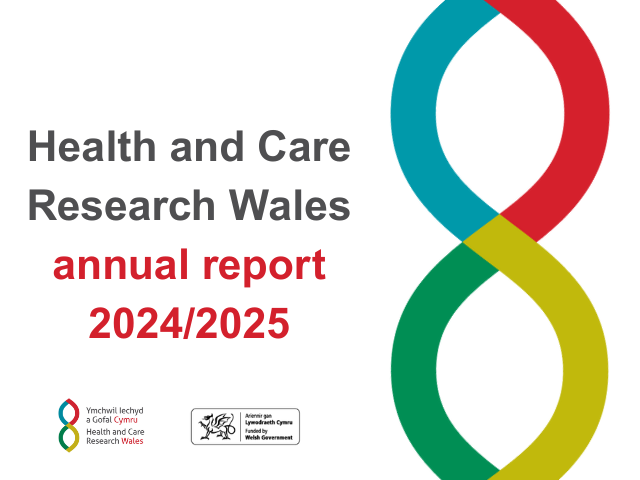
Health and Care Research Wales annual report 2024/2025
Ministerial foreword
It has been another significant year for health and care research in Wales. I’d like to say diolch yn fawr to everyone involved in leading and supporting research across Wales, especially to all those who have dedicated their time to help shape and participate in research, including NHS patients and members of the public involvement community.
This year marks the tenth anniversary of Health and Care Research Wales. Over the last decade, there has been a significant shift in the prominence of science and research – not least the significant role our researchers played in responding to the COVID-19 pandemic. We have continued to build on the important role science and research plays in policy and practice; a key example of this was the development of the Health and Care Research Wales Evidence Centre – taking the Wales COVID-19 Evidence Centre model into a mainstream research and evidence service.
In the last year, we have welcomed the appointments of Professor Isabel Oliver, who has a strong background in research and development, as the new Chief Medical Officer for Wales, and Gareth Cross as Co-Director of Health and Care Research Wales. We will soon appoint a new Chief Scientific Adviser for Health, who will play an important role in co-directing Health and Care Research Wales and leading the Welsh Government’s health and care scientific advisory capability.
There is plenty to be proud of. In 2022 we established the Health and Care Research Wales Faculty to strengthen research career pathways; a core pillar in building and maintaining a world class health and care research system. The UK Voluntary Scheme for Branded Medicines Pricing and Access (VPAG) programme has helped us to establish a new Commercial Research Delivery Centre in Wales, acting as a national network for pioneering clinical trials and creating opportunities to test innovative new treatments with the latest equipment and technology. This means people have greater access to cutting-edge treatments in Wales. We have invested nearly £50 million in sustainability and catalytic funding for 17 research centres, including five new centres, over the next five years.
There are notable advances in the field of cancer research, supported by Health and Care Research Wales, which align with our Tackling Cancer Through Research programme. Work continues to embed research across the whole workforce, with the PRIORITY project, commissioned by the Chief Nursing Officer for Wales, providing an evidence base for a new strategic action plan to strengthen research across nursing, midwifery and the 13 allied health professions. The UK Government has announced a £600 million investment, in partnership with the Wellcome Trust, to establish a UK Health Data Research Service. There is an excellent opportunity for Wales to provide a significant contribution to this work, given the world-leading position we have developed in heath data research through our support and partnership with Swansea University and the Secure Anonymised Information Linkage (SAIL) Databank.
Earlier this year I outlined my five priorities: a focus on prevention, shifting services into primary and community settings, driving forward our digital transformation and use of data, strengthening our regional collaboration and improving NHS leadership and workforce development.
Research underpins each of these. It can have a significant impact on services and patients; it helps discover, develop and evaluate new ways to deliver services in the community. It helps us use data more productively to develop better treatments, tackle inequalities and manage the health and care services more efficiently. We also know that research-intensive environments drive better health outcomes for people, whether they are part of a formal trial or not, and these environments also increase staff satisfaction and retention.
So much of what we have achieved over the last ten years – and the exciting opportunities ahead of us – are contributing to each of these priority areas. This is what makes science, research and evidence such a critical cross-cutting part of our ecosystem in Wales
Through Health and Care Research Wales, we will continue to promote and support health and care research, driving scientific quality, relevant to the needs and challenges of health and social care in Wales to improve the lives of people and communities.
I look forward to continuing to work with the Welsh research community to seize these opportunities and continue to build on what we have learned to date.
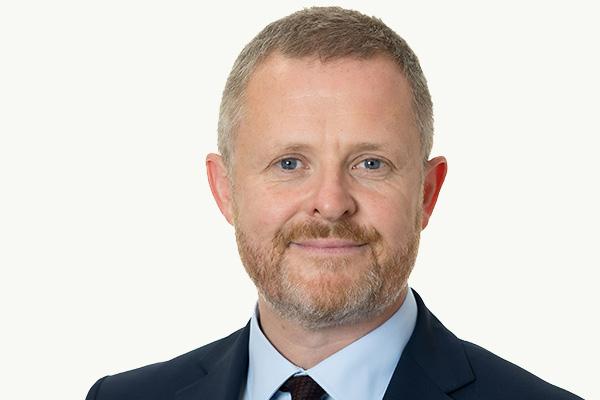
![]()
Jeremy Miles MS, Cabinet Secretary for Health and Social Care
Our year in research
It has been another eventful year in research. As our three-year plan for 2022-25 reaches maturity, and we look back with pride on ten years of Health and Care Research Wales, we want to thank everyone who has made our vision for advancing health and social care research in Wales a reality – including our exemplary researchers working in the NHS and in Higher Education, our funded centres, Faculty, Welsh Government, local authorities and our partners in industry and professional bodies. The quality and breadth of research and development activity in this time has been nothing short of inspirational and we have shown that Wales continues to play a big part in helping to discovering the diagnostics, therapies and treatments of the future, as well as the role that research and evidence play in helping to shape policy both domestically, nationally and internationally. Over the next ten years we will build on this legacy to strengthen health and care research further in Wales as an important and necessary part of our efforts to secure a healthier and fairer Wales.
Particular achievements of the last twelve months include:
- Research development infrastructure
In January 2025 Health and Care Research Wales announced £49 million of Research Development Infrastructure funding for 17 research centres over the next five years. The centres include five new structures - the Wales Applied Virology Unit, National Centre for Suicide and Self-Harm Prevention, Centre for Social Care and Artificial Intelligence Learning, Women’s Health Research Wales and Centre for Vision Services Research. The investment also includes funding for flagship centres such as the SAIL Databank, National Centre for Mental Health and Children's Social Care Research and Development Centre (CASCADE)-Partnership, and will boost academic capability and the amount of high-quality research taking place in Wales. The funding was awarded across two categories - sustainability awards, for currently funded groups to maintain effective models of practice and support a trajectory towards self-sustainability, and catalytic awards, to boost capacity and capability in areas of health and care need and emerging Welsh research strength.
- Voluntary Scheme for Branded Medicines Pricing, Access and Growth (VPAG)
In January 2025 it was announced that patients in Wales will have greater access to cutting edge treatments thanks to a £400 million public-private funding boost, £300 million of which will bolster the commercial research delivery infrastructure across the UK. The Voluntary Scheme for Branded Medicine Pricing, Access and Growth (VPAG) Investment Programme will provide £22.1 million to Wales to significantly enhance Wales’s capabilities in conducting commercial clinical trials. Through this investment we aim to expedite the delivery of commercial trials so that new treatments and therapies can reach the market faster, benefiting patients and driving economic growth. Through funding calls, we have identified areas where the funding can be used to have the highest impact in Wales, and have established a Wales Commercial Research Delivery Centre (Wales CRDC). This will be one of 21 CRDCs across UK and form a CRDC UK Network – providing industry with access to streamlined and coordinated research delivery.
- Women’s health
Women’s health is a high priority for Welsh Government and communication around women’s health issues is a key area within this. In September 2024 we announced the launch of a new women’s health prioritisation project, to identify the ‘unanswered questions’ and gaps in research around communication on all aspects of the health of women and girls aged 16 and above. We analysed over 500 responses, leading to a shortlist of 17 questions which were then further narrowed down to the top ten priorities. A subset of these priorities was subsequently featured in a women’s health focused call for researchers launched in April 2025.
- British Heart Foundation agreement
Health and Care Research Wales and the British Heart Foundation (BHF) announced a significant £3 million agreement to support cardiovascular research in Wales through funding for the National Cardiovascular Research Network (NCRN). The five-year agreement means that Welsh researchers will be able to investigate key areas of unmet health and care needs in people with heart conditions such as arrhythmias (irregular heartbeat), heart disease and vascular ageing. The network, led by Swansea University and Cardiff Metropolitan University, will bring researchers, health professionals, patient representatives and others together to improve the prevention, diagnosis and treatment of cardiovascular disease in Wales and beyond. The agreement will see Welsh Government funding key researcher and leadership posts, with BHF funding additional research staff to help address under-representation of under-served communities in cardiovascular research. Its investment will also support cross-disciplinary research bids and access to data to support cardiovascular research.
- Research delivery
Throughout 2024-25 we have supported research delivery in Wales through studies such as VAPOR, a world-first breath test trial for early detection of pancreatic cancer conducted at Swansea Bay University Health Board. IRFLUVA, sponsored by Cardiff University, sought to determine whether taking a simple wheatgerm food supplement could improve the long term immune response to the flu vaccine among older people. Welsh researchers and participants have played a vital role in a groundbreaking clinical trial to evaluate the efficacy and safety of a new mRNA norovirus vaccine, Nova-301, sponsored by Moderna. Cardiff and Vale University Health Board was named as the sole site in the UK for an international clinical trial, Edelife, that could improve treatment options for patients affected by a rare and life-threatening genetic condition. In February 2025 the first patient in Wales received an investigational BioNTech vaccine on World Cancer Day to treat her own specific form of colon cancer. In March, Morriston Hospital, Swansea became the first site in Wales to start recruiting for the UK-wide BachB trial for poorly babies who need help with their breathing, thanks to delivery support funded from Health and Care Research Wales.
- Health Determinants Research Collaborations
In January 2025 Torfaen County Borough Council became one of six new Health Determinants Research Collaborations (HDRC) to go live across the UK with funding from the Department of Health and Social Care, through the National Institute for Health and Care Research (NIHR). Torfaen joins Rhondda Cynon Taf as one of the two HDRCs in Wales benefitting from the £55 million research investment aimed at tackling health inequalities and improving health outcomes for people across the UK. These innovative local government partnerships span the UK and will boost research capacity and capability in some of the UK’s most deprived communities.
- Senior Research Leaders
Health and Care Research Wales announced its next cohort of Senior Research Leaders from across academia, to provide leadership, to act as ambassadors and advocates for health and care research, and to play a central role in supporting the next generation of health and care research leaders in Wales through mentorship, advice and support to the research community. 20 Senior Research Leaders have taken up the role for the next three years and will play a vital part in developing the health and care research community in Wales, mentoring early career researchers and developing the next generation of research leaders.
- Specialty Leads
In March we announced the new appointments of our 31 Wales Specialty Leads for 2025-28, to continue to champion and support research delivery, build networks of principal investigators within their specialty, and support the uptake of studies throughout Wales, as part of the Health and Care Research Wales Support and Delivery Service. Through this appointment process new Specialty Lead roles in imaging and palliative care have been created, in addition to appointments in established specialty areas.
- Faculty personal awards
In June 2024 we launched a new range of personal award schemes through the Health and Care Research Wales Faculty to promote research careers for all disciplines, across all sectors, and at all stages of the research career pathway and boost the number of emerging independent researchers in Wales. The schemes are structured across two main areas - the Researcher Development Award Scheme (with a range of award pathways aligned to our vision of more developmental opportunities for Welsh researchers), and the Doctoral, Next steps and Advanced Fellowship Schemes. Award holders will be able to access personal and researcher development opportunities through Faculty membership for the duration of their award.
- New project grants
In October 2024 we announced the recipients of our project awards, which were awarded to researchers not only for their individual projects across a variety of topics, including trauma therapy, mental health in children and adolescents, primary care for unwell children, evaluating social work practice quality, and cervical screening for women who have experienced sexual violence and abuse, among others. Seven projects will receive funding under the Integrated Funding Scheme Arm 1 (Translational and Clinical Research) and Arm 2 (Health and Social Care Services and Public Health Research).
- Annual conference and events
Women’s health took centre stage at the ninth annual Health and Care Research Wales conference, with speakers and topics highlighting the vital part individuals and delivery teams have played in Wales’ research successes over the past year. Hosted by BBC Wales Health correspondent Owain Clarke, the conference, themed Research Matters, saw almost 550 people attending either in-person or online, and featured a plenary speech by the Chief Medical Officer for Wales, Dr Frank Atherton. Health and Care Research Wales representatives have also attended a number of events hosted by our partners over the year including the 15th anniversary of the Centre for Development, Evaluation, Complexity and Implementation in Public Health Improvement (DECIPHer), as well as the launch of a major £3 million joint funding deal between British Heart Foundation and Health and Care Research Wales to support cardiovascular research through the National Cardiovascular Research Network (NCRN), and the Health and Care Research Wales Evidence Centre Symposium, attended by the Cabinet Secretary for Health and Social Care.
- Inclusivity Action Plan
We met with our Equality, Diversity and Inclusion (EDI) Advisory Group in January 2025 to consult on the Inclusivity Action Plan, which has now been published on our website. The official launch took place on 18 September 2025 at the Senedd Cymru. Health and Care Research Wales also has a partnership with the Centre for Research Equity, Oxford University and is supporting some elements of their plan.
- Discover Your Role 2.0
Between November 2023 and March 2024, we gathered feedback on Discover Your Role 2.0, our four-year plan to improve public involvement in Welsh research, through online surveys to identify any barriers. In March 2024, we presented and confirmed 15 key barriers, which shaped our approach moving forward. We hosted Community of Practice events, engaging over 180 people from various organisations and the insights from these events guided the consultation phase, which ran from September 2024 to January 2025. Based on feedback received, we refined the action plan, finalising it in March 2025, with a webinar to public members and researchers to highlight the focus areas and activities, with the official launch of the Discover Your Role 2.0 in April 2025.
Research achievements
Research delivery

16,589 participants recruited into high-quality research studies
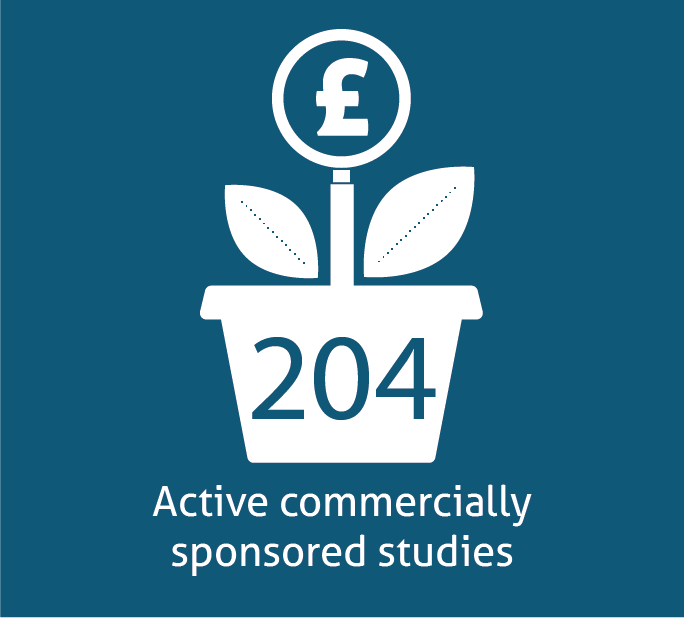
204 active commercially sponsored studies
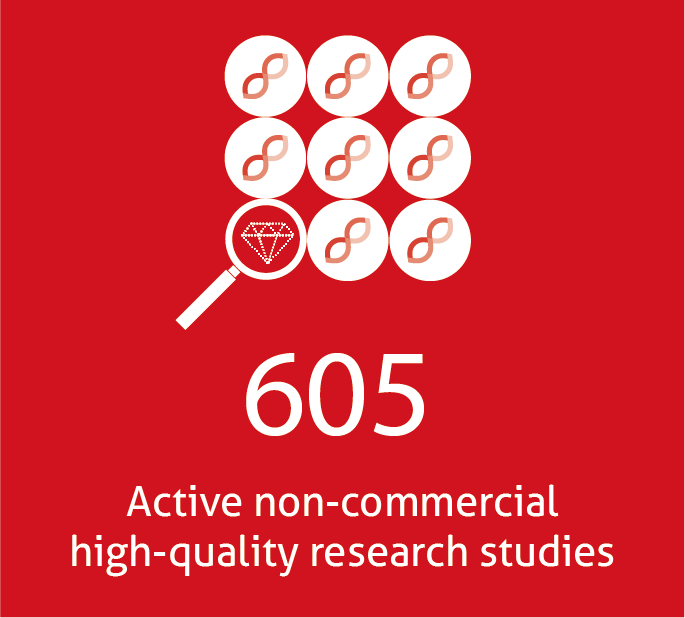
605 active non-commercial high-quality research studies
Our funded centres
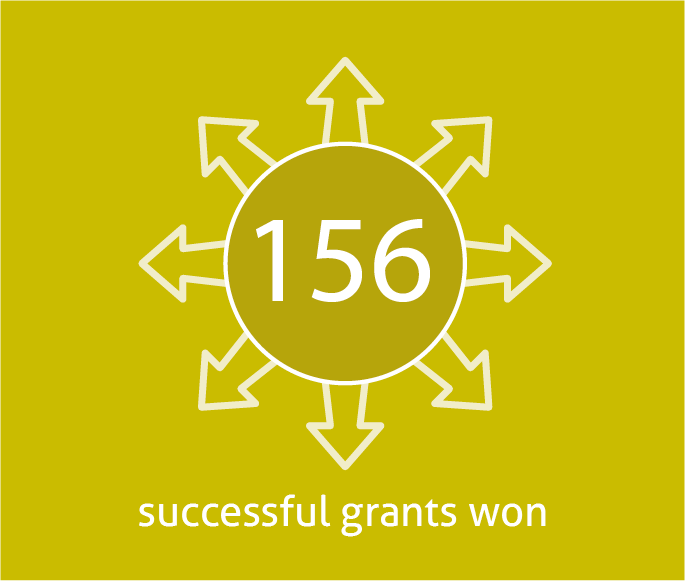
156 successful grants won
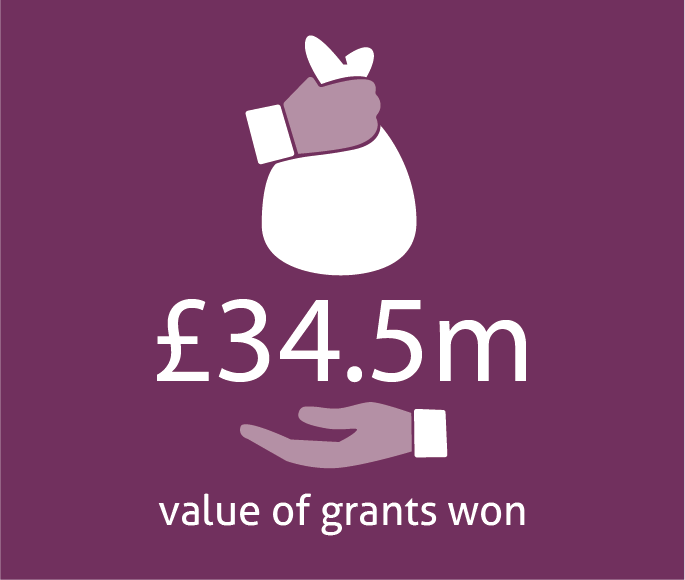
£34.5 million value of grants won
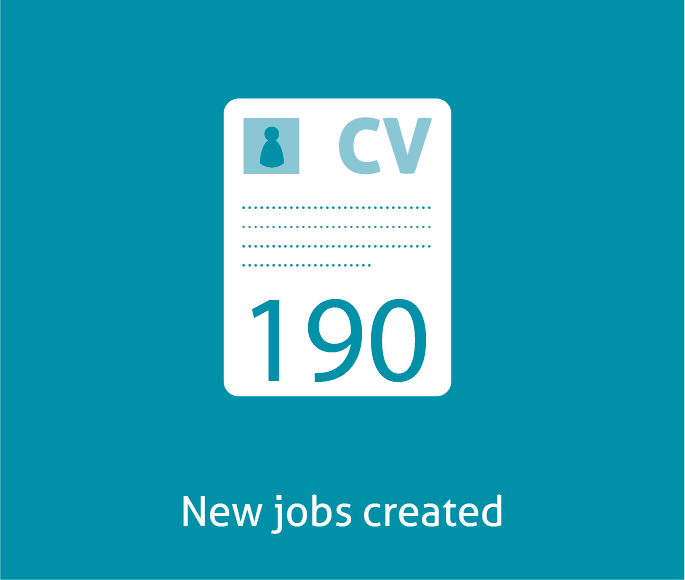
190 new jobs created
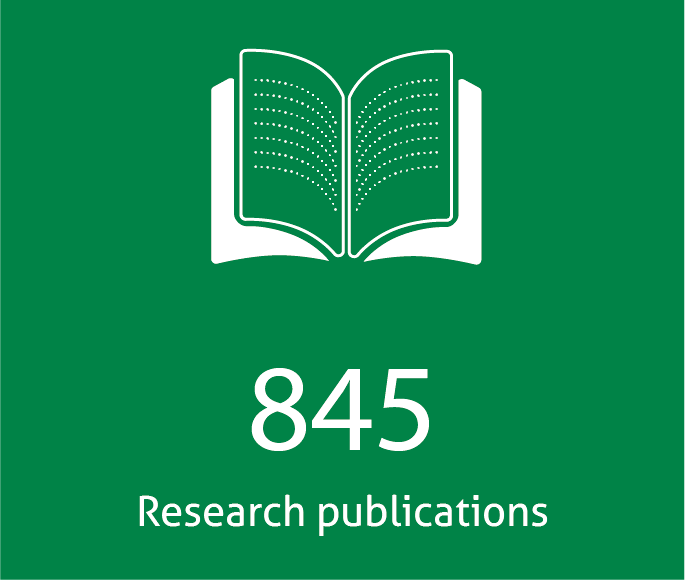
845 research publications
Our funded schemes
£7,645,396 across 61 awards and 11 schemes*
* Calls that opened in financial year 2024-25
Research matters – people in research
- Public involvement – Claire Bryant
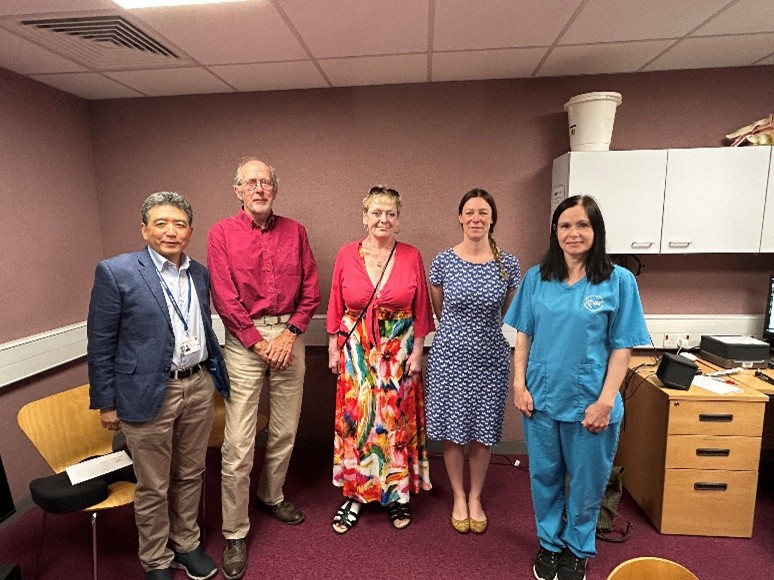
Claire Bryant (fourth right) is a public involvement representative on an innovative study into glue ear, a common condition in which fluid builds up in the middle ear space causing temporary hearing loss. The study, Daisydome, led to the development of an artificial intelligence system for the automated diagnosis of glue ear in children, and has been ongoing throughout 2024-25, with public involvement input into a survey of attitudes to the use of artificial intelligence (AI) in healthcare. Funding has also been received from the British Council for a follow-on project being conducted jointly with universities in Japan, with the aim of developing a low cost AI-powered device which can be used for diagnosis globally, particularly in low and middle income countries. Claire has been actively involved in the study from the outset, having discovered that her daughter suffered from glue ear a few years ago, and found it difficult navigating the treatment process via primary and secondary care. She ‘jumped at the opportunity’ to become involved in the study, and was involved in the setup of an animated video which children and parents can watch to better understand the research. Claire was also able to see the device in action at the University Hospital of Wales, meeting children and parents alike and providing feedback throughout the study.
- Senior researcher - Professor Rob Jones
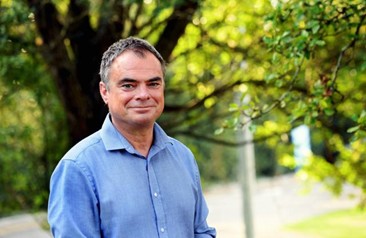
Professor Rob Jones is Assistant Medical Director for Research at Velindre University NHS Trust, Professor of Medical Oncology at Cardiff University and was Chief Investigator on the FAKTION trial, which investigated whether researchers could reverse or delay resistance to hormone therapy in post-menopausal women whose cancer had spread by adding a targeted therapy called Capivasertib to existing therapy. In June and July 2024 Capivasertib was approved by the European Medicines Agency and Medicines and Healthcare products Regulation Agency (MHRA) respectively - the first time that a Welsh-led study has resulted in a first-in-class drug being licensed for use in the UK and US. Earlier this year, Gwen Buchan, from Barry, became the first patient in Wales to start treatment with Capivasertib having first received treatment for primary breast cancer 16 years ago before being diagnosed with secondary cancer last year. In an interview with BBC Wales, Gwen spoke of how important it was to keep hope, while Professor Jones described the FAKTION trial and resultant licensing of Capivasertib for NHS patients as ‘a great success story for Wales.’
- Patient impact – Emily Handstock

Emily Handstock, 26, from Aberdare, has battled with severe period pain since she was 15, which has affected many aspects of her life, including taking exams at school. In December 2024 she featured in a BBC Wales news programme about her experiences and her involvement in helping to shape a research study funded by Health and Care Research Wales, called Severe Period Pain is Not Normal (SPPINN). The SPPINN study aims to explore the impact of severe period pain across different communities and age groups. Upon completion, the study will produce recommendations to improve education and care around the condition. Lead researcher Dr Robyn Jackowich told the BBC of her hopes that the findings of the study would help NHS Wales to achieve the aims of the Women’s Health Plan, through a greater understanding of what is needed in healthcare and education to better support individuals with severe period pain in Wales.
- Faculty member – Dr Savita Shanbhag
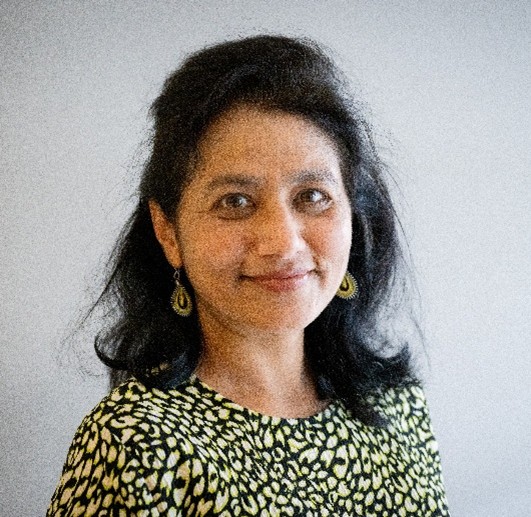
Dr Shanbhag works as GP Cancer Lead at Hywel Dda University Health Board , where she promotes early diagnosis of cancer and strengthens communication between primary and secondary care at health board and national levels. Savita’s leadership has been recognised with several accolades, including the Hywel’s Applause Innovation Award (2022) and the NHS Wales Award (Winner, 2024). She has secured over £950,000 in research and innovation funding. In 2024, she secured the Health and Care Research Wales Emerging Researcher Award, mentored by Professor Kate Brain’s team at Cardiff University. She has been Co-Chief Investigator on a Cancer Research UK study investigating a community pharmacy service for early bowel cancer diagnosis and Co-Applicant on an NIHR Programme Development Grant tackling inequalities in bowel cancer detection. Savita has also delivered numerous oral and poster presentations at national conferences in 2024-25, including Cancer Research UK, MediWales and the Wales Cancer Research Conference. Additionally, Savita has used the time funded by her awards for research collaboration with Welsh and English teams and been successful with writing articles for publications in peer reviewed journals.
- Healthcare professionals – Siân Price
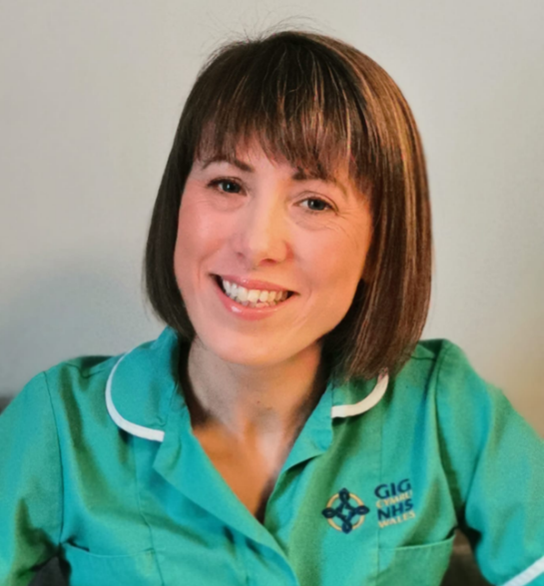
Siân is a Clinical Pharmacist and Principal Investigator for the UK Antimicrobial Registry (UKAR) study at Cwm Taf Morgannwg University Health Board, working with a team who are passionate about improving patient care through research. The UKAR study, which focuses on antimicrobial resistance and recruited its first patient in September 2024, is Siân’s first experience of being a principal investigator. Working closely with the Health Board’s Research and Development department, the team is dedicated to ensuring the study's success. The Health Board have met the study’s recruitment target and is continuing to recruit patients to further advance understanding of antimicrobial resistance. Siân’s role as a Clinical Pharmacist has allowed her to bring a unique perspective to research and she is passionate about translating evidence into practice. The UKAR study has allowed her to collaborate with a talented team and contribute to the development of new knowledge that will benefit patients. While being a significant undertaking, Siân said that her research knowledge and skills have improved exponentially through this exposure. Siân has very recently started as the Health Board’s Principal Pharmacist for research and clinical trials, and has been awarded VPAG funding to complete two online courses recommended by a UK-wide network of clinical trials pharmacists to enable her to gain further experience of commercial clinical trials.
Looking ahead
In Wales, as with the rest of the UK, research continues to evolve, driven by strategic investment, structural reform and growing collaboration.
We are incredibly fortunate in Wales to have the Wellbeing of Future Generations Act, that places a statutory duty on Welsh Government, and our public bodies, to improve the social, economic, environmental and cultural wellbeing of Wales. In addition to this, Welsh Government has shown it was ahead of the curve with the development of ‘A Healthier Wales’; our ten year strategy for the health and social care system in Wales that places the shift from hospital based to community based care at its core. Research is integral to any approach in meeting the expectations set out through the act, and in our health and care strategy; without it we can’t begin to say what the future will bring or develop new treatments and models of care to meet the future needs of the population.
Already our research has helped understand better the challenges we face. Last year, we played a key role in the production of a major report on disease projections in Wales by the Chief Scientific Adviser for Health, which made it clear that simply maintaining current approaches will not suffice. It's also important for us to deepen our understanding the value of research and how it impacts public health and wellbeing, recognising its significance in strengthening and improving the nation's health.
The fact remains, that the people of Wales are suffering poor health outcomes, and the gap in years spent in good health between the least and most deprived is growing. The impact of the COVID-19 pandemic and the turbulent economy has left a lasting imprint and increased inequalities in Wales. Research is necessary to help us understand and tackle effectively these complex challenges directing our efforts to the interventions that work.
Looking forward, it is essential that we continue to strengthen health and care research in Wales, building a strong infrastructure, expanding our capability and capacity, and nurturing both our expert talent and new generation of researchers to produce world leading research and innovation. By targeting our efforts in line with robust scientific evidence we will improve health and care outcomes in Wales, reduce inequalities and strengthen the economy for generations to come.
Gareth Cross, Deputy Director of Science, Research and Evidence, Welsh Government
Professor Isabel Oliver, Chief Medical Officer for Wales